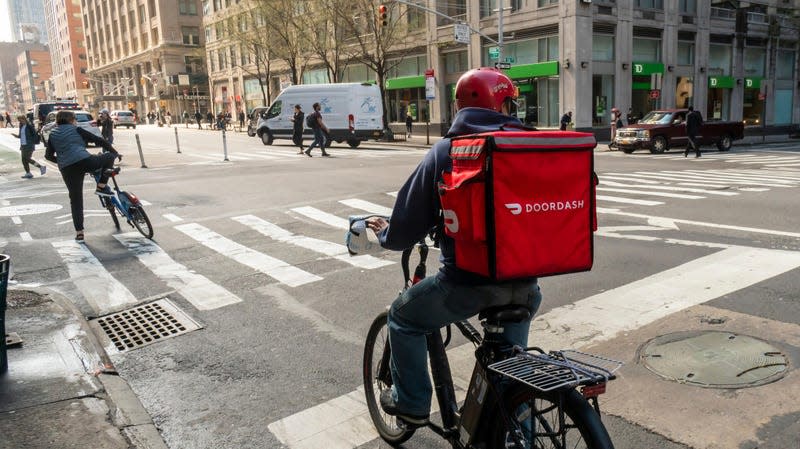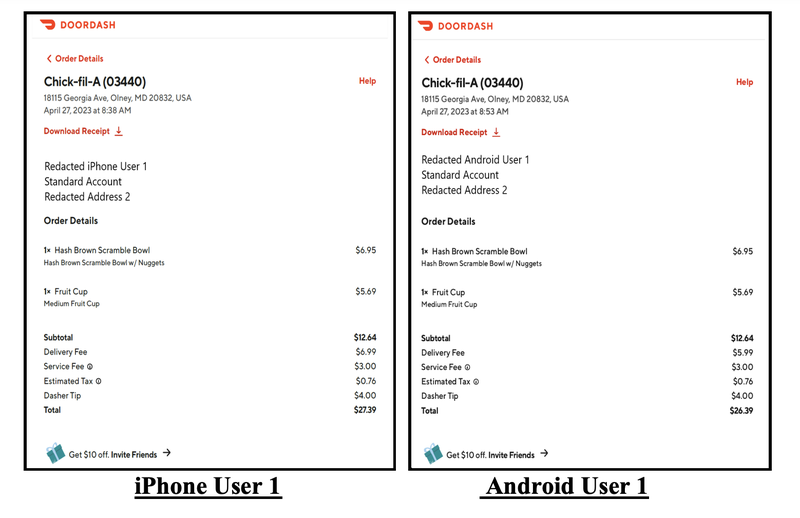Lawsuit Claims Apple Users Are Charged More for Delivery on DoorDash

A new lawsuit criticizes DoorDash for not explicitly using delivery fees to pay drivers and for ‘expanded range fees’ which don’t account for distance from the restaurant.
If you’ve spent more time comparing your DoorDash bill on your iPhone to your friend’s Android device than actually eating your delivery food, you might be on to something—at least according to a recent lawsuit. According to an amended complaint filed May 5 in Maryland federal court, Apple users get the raw end of the deal in delivery and “expanded range fees” when placing an order on DoorDash.
The lawsuit was brought by Maryland-based DashPass subscriber Ross Hecox and his sons. The 134-page complaint reads like a book of grudges against the service’s allegedly obtuse fee structure. Primarily, it targets the “expanded range fees” placed on certain orders, saying the company will charge users extra for delivering from restaurants further away despite there being closer options available, or in other words “DoorDash manipulates delivery areas based on its Dashers locations, consumer demand, and merchants’ partnership with DoorDash.”
Read more
This “expanded range fee” has come up in some user circles as a particular pain point despite it not being listed under the company’s official fees. DoorDash has claimed this fee applies when ordering from restaurants outside their area, and that the fee is showcased both on the restaurant page as well as at checkout.
The lawsuit says that based on multiple tests, two deliveries placed at the same time to the same restaurant addressed to the same location resulted in two different fees. A DashPass subscriber received an expanded range fee, but the regular user did not. Most importantly, an iPhone user in orders placed to Chick-fil-A, and a local steak house received the expanded range fee or higher delivery fees, while an Android user did not.

“DoorDash charges the expanded range fee on iPhone users more often than Android users and charges iPhone users more for ‘delivering,’” the complaint reads.
In an email statement sent to Gizmodo, a DoorDash spokesperson said:
“The claims put forward in the amended complaint are baseless and simply without merit. Our priority is to provide the best service possible and ensure there is clarity for consumers that allows them to make informed decisions. We ensure fees are disclosed throughout the customer experience, including on each restaurant storepage and before checkout. Building this trust is essential, and it’s why the majority of delivery orders on our platform are placed by return customers. We will continue to strive to make our platform work even better for customers, and will vigorously fight these allegations.”
The complaint also claims that DoorDash tricks users into believing delivery fees are going to the Dashers who are delivering food, but that the company takes the pot. Meanwhile, the company has claimed a part of those fees go to pay delivery drivers and fund insurance costs. The lawsuit is currently seeking class-action status.
“DoorDash utilizes a psychologically manipulative pricing structure that strategically misleads, deceives, and defrauds consumers into using the technology platform at a much higher, premium cost,” the lawsuit reads.
The lawsuit tries to imply DoorDash charges Apple users more because iPhone users earn more on average than Android users. However, Apple also charges an extra 30% on in-app purchases made through the regular iPhone in-app payment system. This fee has incentivized some companies to charge more for premium services for iPhone users.
More from Gizmodo
Sign up for Gizmodo's Newsletter. For the latest news, Facebook, Twitter and Instagram.

